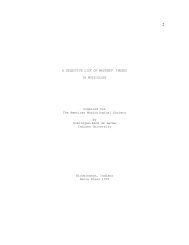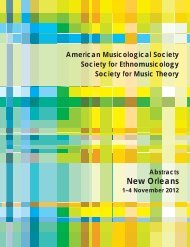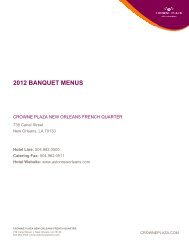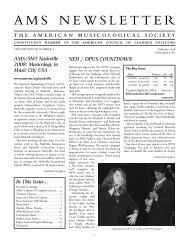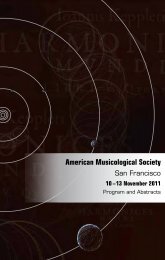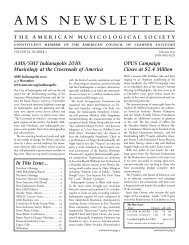AMS Philadelphia 2009 Abstracts - American Musicological Society
AMS Philadelphia 2009 Abstracts - American Musicological Society
AMS Philadelphia 2009 Abstracts - American Musicological Society
Create successful ePaper yourself
Turn your PDF publications into a flip-book with our unique Google optimized e-Paper software.
<strong>Abstracts</strong> Friday morning 67<br />
Focusing on gustavo iii, this paper identifies the unofficial censors (they turn out to be the<br />
Director of the Police, a high-ranking lawyer, the impresario’s right-hand man, and even the<br />
impresario himself), determines their political or religious function, and interprets some of<br />
their emendations. In addition, the paper will show that the unofficial censors worked together<br />
much more closely than we have so far believed (handing the libretto back and forth among<br />
themselves) and that they censored much more thoroughly than their official colleagues. They<br />
were not satisfied with simply eradicating problematic words or phrases but returned to the<br />
same passage time and again, hoping to improve it. In the case of Un ballo in maschera, where<br />
the composer and librettist had a chance to react to the censors’ work, the result was on occasion<br />
surprisingly good.<br />
PoPulAr genres in the eArly tWentieth century<br />
David Ake, university of nevada, reno, chair<br />
SCHEMING YOUNG LADIES: IMAGES OF FEMALE<br />
MUSICIANS IN RAGTIME-ERA NOVELTY SONGS<br />
Larry Hamberlin<br />
Middlebury College<br />
“As late as the 1920s,” wrote Jacques Barzun in Music in <strong>American</strong> Life, “untutored popular<br />
sentiment regarded the playing of music as the occupation of wretched professionals and<br />
scheming young ladies.” Ragtime-era novelty (i.e., comic) songs about female musicians, and<br />
especially singers, provide some clues as to why such a negative stereotype was both widespread<br />
and long-lived. Coinciding with the peak of the women’s suffrage movement, these<br />
songs may represent an antisuffragist backlash, lampooning “scheming” women’s quest to<br />
pursue careers in music, where their financial independence presented a threat to patriarchal<br />
norms.<br />
Yet the ridicule of women singers did not end with the Nineteenth Amendment. Ragtime<br />
songs set the pattern for the still-current soprano joke, which may express other musicians’<br />
resentment of the diva’s power over audiences. Moreover, the soprano voice itself may be an<br />
object of psychological discomfort that male listeners might want to defuse with humor. Yet<br />
another cause of male discomfiture is an association of female display with disreputable entertainments<br />
such as the burlesque show—self-display, even on the operatic stage, some songs<br />
imply, is intrinsically indecent.<br />
Because so many of these songs focus on “unfeminine” ambition, voice students and other<br />
aspiring singers feature prominently among the protagonists. This paper considers in turn<br />
portraits of voice students, amateur singers, and professional singers, tracking the increasingly<br />
negative portrayals of women’s aspirations, and concludes by comparing these songs with a<br />
few novelties about male singers, which suggest that vocal display was increasingly perceived<br />
as a feminine-gendered social practice.



